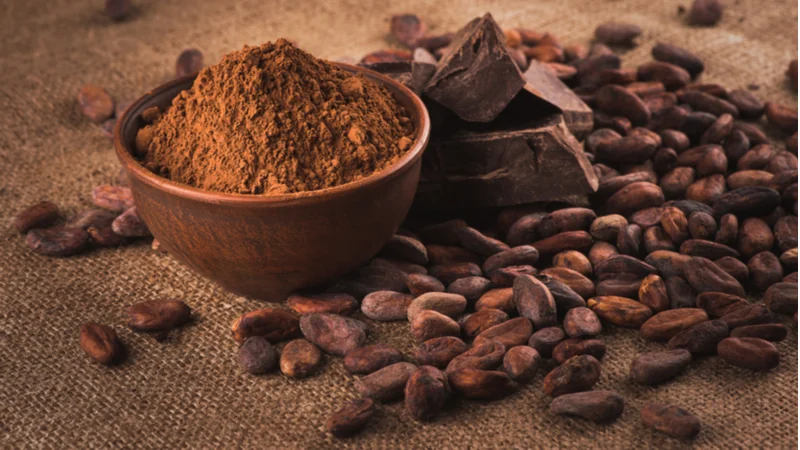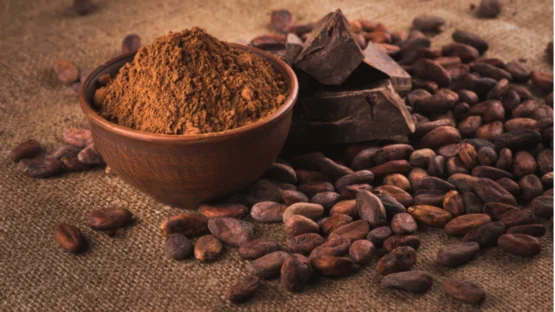A large-scale, randomized, controlled trial has found that in aging adults, cocoa extract does not affect the prevalence of adverse cardiovascular events but decreases their lethality [1].
Rich in flavanols
The nutrients that we consume obviously impact our healthspan and lifespan, but studying their effects in a controlled environment in humans is not easy. Most of our knowledge comes from population studies that can be contaminated by confounding variables, untrustworthy self-reporting, unreported changes in dietary behavior over the course of the study, and so on.
Therefore, when a nutrient gets tested in a well-controlled trial, it’s always a big deal. Scientists from Harvard University and Fred Hutchinson Cancer Research Center in Seattle have just published results from a trial that studied the effects of cocoa extract supplementation on cardiovascular diseases: the number one cause of age-related mortality in the world.
Cocoa, chocolate’s main ingredient, is rich in flavanols, a type of phytochemicals known for their beneficial qualities, especially epicatechin, which has been linked to cardiovascular health by previous research [2]. Other good flavanol sources include kale, tea, grapes and red wine, berries, tomatoes, and broccoli. The exact mechanism by which flavanols seem to improve cardiovascular health is unknown, but it probably includes boosting the production of nitric oxide (NO), which is involved in vasodilation [3].
Same number of events, decreased severity
This randomized, double-blind, placebo-controlled trial study was called COSMOS (COcoa Supplement and Multivitamin Outcomes Study) and lasted 3.6 years. It was sponsored by Mars Edge, the manufacturer of cocoa-based supplement CocoaVia, although the company was not involved in the study design or collection of data. It was conducted among 12,666 women aged 65 and older along with 8776 men aged 60 and older in the United States.
The participants, who had to be free of major cardiovascular diseases and cancer at baseline, were randomly assigned to take either a cocoa extract supplement that contained a total of 500 mg of flavanols, including 80 mg of epicatechin per dose, or placebo. The researchers looked at the prevalence of the following cardiovascular events: cardiovascular death, myocardial infarction, stroke, coronary revascularization, carotid artery disease, peripheral artery surgery, and unstable angina.
During the follow-up, cardiovascular events happened in 410 participants who were on cocoa extract, and in 456 of those who were on placebo. Although the second number is a bit bigger, the difference was not statistically significant. However, participants who took the supplement had a 27% reduced risk of cardiovascular death. This interesting finding might mean that cocoa extract reduces the severity of cardiovascular events, rather than their occurrence. One of the secondary endpoints was the prevalence of cancer, which was unaffected by the treatment.
Smoking as the only significant factor
The researchers controlled for various potentially relevant factors, such as age, sex, education, smoking status, diabetes status, cardiovascular health, and, of course, chocolate consumption since it could affect dosage. Smoking status was the only one that showed correlation with the overall occurrence of cardiovascular events: people who have smoked more than 100 cigarettes throughout their lifetimes in the cocoa extract group had significantly fewer cardiovascular events than smokers who received placebo.
No serious adverse effects were observed, although people taking the supplement were 6% more likely to self-report nausea. On the other hand, the cocoa extract group reported 5% fewer flu-like symptoms and 15% fewer migraines, which is quite substantial.
While cocoa extract has been shown to be good for cardiovascular health, this study is not an excuse to consume chocolate at will. In dark chocolate, the best source of non-fat cocoa solids apart from cocoa powder, flavanol contents can vary widely, from 93 all the way to 793 mg per 100 grams [4], and this data is not on the wrapper. In addition to the beneficial flavanols, chocolate is also packed with fat, sugar, and many other ingredients, which might be the reason why data on the health effects of chocolate has been largely inconclusive so far.
Conclusion
According to this high-quality study, cocoa extract, when consumed regularly, may decrease the severity of cardiovascular events and lead to less cardiovascular mortality in people over 60. People with a history of smoking benefit from cocoa extract supplementation more than others. Finally, cocoa extract seems to reduce migraines. These results can possibly be extrapolated to other flavanol-rich foods, though additional research is needed.
Literature
[1] Sesso, H. D., Manson, J. E., Aragaki, A. K., Rist, P. M., Johnson, L. G., Friedenberg, G., … & Anderson, G. L. (2022). Effect of cocoa flavanol supplementation for the prevention of cardiovascular disease events: the COcoa Supplement and Multivitamin Outcomes Study (COSMOS) randomized clinical trial. The American Journal of Clinical Nutrition, 115(6), 1490-1500.
[2] Dower, J. I., Geleijnse, J. M., Hollman, P. C., Soedamah-Muthu, S. S., & Kromhout, D. (2016). Dietary epicatechin intake and 25-y risk of cardiovascular mortality: the Zutphen Elderly Study. The American journal of clinical nutrition, 104(1), 58-64.
[3] Heiss, C., Keen, C. L., & Kelm, M. (2010). Flavanols and cardiovascular disease prevention. European heart journal, 31(21), 2583-2592.
[4] Langer, S., Marshall, L. J., Day, A. J., & Morgan, M. R. (2011). Flavanols and methylxanthines in commercially available dark chocolate: a study of the correlation with nonfat cocoa solids. Journal of agricultural and food chemistry, 59(15), 8435-8441.





